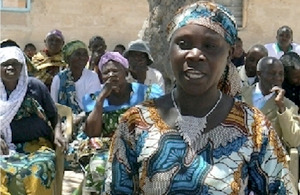DFID Research: Adapting to climate variability and climate change in Tanzania
Women farmers in semi-arid central Tanzania are learning how to adapt farming practices to cope with changing conditions.

Cecilia and her women farmers' group are learning to adapt to climate change. Picture: CCAA
“In the past, the rains lasted from November through to April, but in recent years, they have started later and finished sooner,” Cecilia explains, “And when the rains fail, it is the women and children that suffer most.”
Cecilia Mahadari is a farmer from the village of Chibelela in Bahi District, in the semi-arid central region of Tanzania. She is 1 of the millions of smallholder farmers that form the backbone of Tanzania’s rural economy but who are increasingly challenged by changing rainfall patterns, increased wind speeds and greater temperature extremes. These changes combined with other social, political and environmental forces, are pushing many families into a marginal existence.
The farmers in Chibelela attribute climate changes to forest loss, the increasing population and witch doctors’ anger.
Cecilia is a member of a woman’s group which is building women’s understanding of how to adapt farming practices to better cope with the changing conditions. They have established a farmers’ field school where they are experimenting with different soil, water and crop management options. They also participate in an action research programme where they discuss with local researchers how they can make their agricultural practices more resilient to climate change.
Through this programme, researchers have found that villagers in places like Chibelela know that they need to diversify. Paradoxically, this involves the re-discovery of old crop varieties (replacing maize with more drought resistant early maturing varieties of sorghum and millet), but which interestingly also have higher nutritional values. In other instances, particularly where political and market signals are positively reinforcing, climate variability has stimulated innovation. In the Chibelela case, farmers are experimenting with new crops such as sunflower and (grape) vines, to supply the local oil processing market and wine producers. These crops are also now providing farmers with new drought resistant cash crops and even possibly biodiesel (sunflower) for local electricity generation in the future.
Cecilia’s village is one of a number of sites in Tanzania and neighbouring Malawi, where researchers led by the Institute of Resource Assessment at the University of Dar es Salaam, farmers and policy makers are working together through the DFID and IDRC-funded Climate Change Adaptation in Africa (CCAA) programme.
More Information
The CCAA is a research and capacity development programme, and a joint initiative of DFID and IDRC (2006 to 2011). DFID CRD has committed £24 million, and IDRC £6 million. There are currently 24 participatory action research projects addressing a diversity of topics in countries within all regions of the continent, including agriculture, coastal zone management, disease prediction models and urban issues.